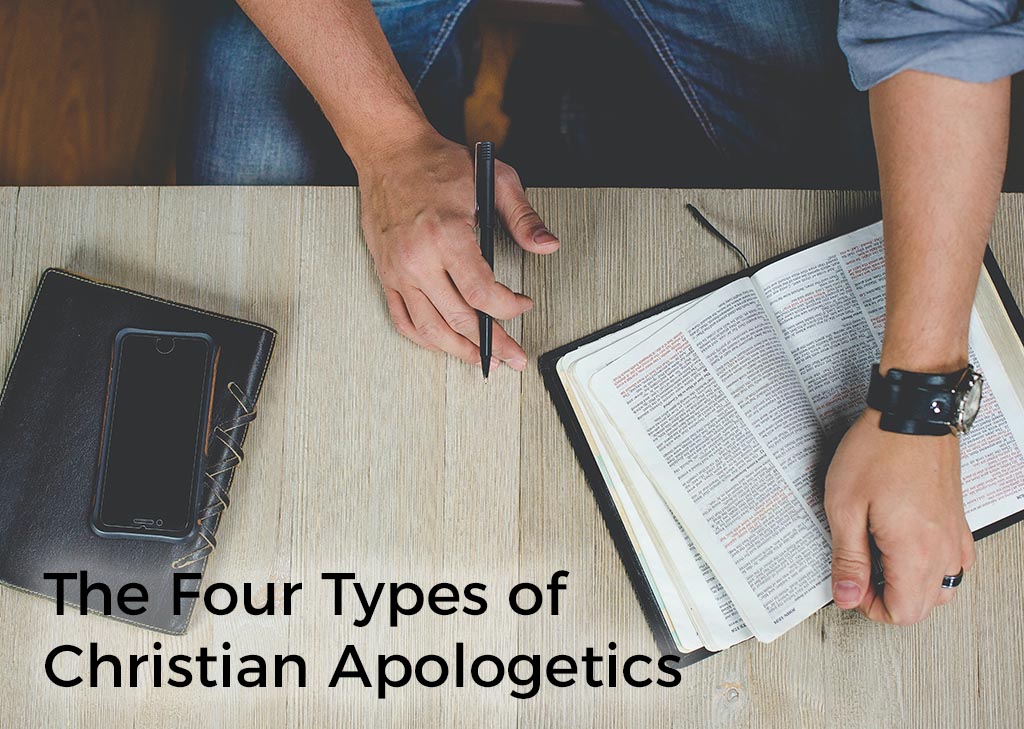
I believe wholeheartedly in the existence of God, that the Bible is the Word of God, and that Jesus was a real person and actually died and rose from the dead. Why? Wishing thinking? Blind faith? No. I have numerous legitimate, factual reasons why I believe in the Christian faith, and I outline several of them in my blog post Top 9 Reasons Why I Believe in Jesus Christ. In that article, I use several arguments from apologetics to make my case.
Most people – even a great deal of professing Christians – are unfamiliar with the concept of apologetics. They may hear the term and think that it has to do with apologizing for something. Let me tell you that this is not the case.
Christian apologetics is the branch of Christian theology that seeks to provide a rational defense and explanation of the Christian faith. It aims to answer questions and objections that people may have about Christianity and provide reasons why the Christian worldview is reasonable and credible.
The term “apologetics” comes from the Greek word “apologia,” which means “a defense” or “a reasoned argument.” In the context of Christianity, the term is used to describe the practice of presenting evidence and arguments in support of the faith. The earliest Christian apologists were the apostles themselves, who defended their teachings against various objections and criticisms. Over time, the tradition of Christian apologetics developed, with notable figures such as Augustine, Anselm, and Thomas Aquinas contributing to its development. Today, Christian apologetics is a recognized discipline within Christian theology, with scholars and practitioners working to provide reasoned, well-developed, and logically-sound answers to challenges to the Christian faith.
The Four Types of Christian Apologetics
There are four main types of Christian apologetics: classical, evidential, presuppositional, and fideism.
Classical apologetics is the oldest type of Christian apologetics. It uses philosophical arguments to prove the existence of God and argues that the Christian God is the only logical choice. Classical apologists argue that reason and faith are not in conflict and that reason can be used to support faith.
For instance, classical apologists could use the cosmological argument, which argues that everything in the universe must have a cause, and that cause must be God. Another example is the moral argument, which argues that objective morality exists and that this morality must have come from God.
Evidential apologetics is focused on using evidence from history, science, and other fields to support the truth of Christianity. It argues that there is enough evidence to support the existence of God, the resurrection of Jesus, and other Christian beliefs. Evidential apologists also believe that faith and reason can work together.
Evidential apologists might use the argument from prophecy, which argues that the fulfillment of Old Testament prophecies about the coming of Jesus is evidence of the truth of Christianity. Another example is the argument from design, which argues that the complexity of the universe and the human body are evidence of intelligent design.
Presuppositional apologetics differs from the other types of Christian apologetics because it starts with the belief that Christianity is true and then argues from there. In other words, followers of Jesus already pre-suppose he is the Son of God and that the Bible is the inspired, inerrant Word of God. Presuppositional apologists believe that everyone has a set of presuppositions or beliefs that they start with and that these beliefs shape how they interpret evidence. It argues that Christianity is the only set of presuppositions that make sense of the world.
For example, presuppositional apologists may contend that the existence of objective morality and the human conscience can only be explained by the existence of God. Another example is the transcendental argument, which argues that the existence of logical and moral absolutes can only be explained by the existence of God.
Presuppositional apologetics can also be what other forms of apologetics ultimately lead up to. Philosophers can reason using classical or evidential apologetics to build up the case that leads them to accept that the Bible is trustworthy or that Jesus is God, and from there, presuppositions arguments will come from a place of authority rather than outside authority.
Fideism is a type of Christian apologetics that emphasizes faith over reason. Fideists argue that faith is a gift from God and that we cannot use reason to understand God. It believes that reason is limited and cannot fully understand God and that we must rely on faith alone.
For example, fideists might argue that we cannot understand the Trinity or the nature of God, but we must trust in God’s revelation of himself through the Bible. Another example is the argument from personal experience, which argues that individuals can only genuinely understand God through their personal experience with Him.
Each of these four types of Christian apologetics offers a unique approach to defending and explaining the Christian faith. Classical apologetics relies on philosophical arguments, evidential apologetics uses evidence from various fields, presuppositional apologetics starts with the belief that Christianity is true, and fideism emphasizes faith over reason. All of these approaches share the same ultimate goal of helping people understand and believe in Christianity, but they differ in their methods and assumptions. Whether one uses reason or faith, the study of apologetics seeks to provide evidence and support for the Christian faith.

11 Comments
JB
Thanks for this post. I’m looking for a place to study presuppositional apologetics in the States. Hope to head over there in 2025, by God’s grace. Would love to better equip myself to defend the faith and share the gospel.
The options seem overwhelming. Not sure what to choose. It seems it’ll come down to cost and personal choice. Would love it to be on the eastern side of the US, I think. It seems there are some options in Pennsylvania, North Carolina, etc. Might choose Penn, just because I’ve always wanted to try a real Philly cheesesteak in Philadelphia. 🙂
Greetings from South Africa.
Scott Roberts Author
JB, what school in Pennsylvania are you looking at?
Malou Aubry
Thanks Scott for breaking down apologetics in its 4 different main types. I knew it was about defending the Christian faith against non-believers’ assaults and attacks but l learned a different additional prospective.
MC
JB, just self-study the works of Gordon H Clark. ‘Thales to Dewey’ is his masterpiece.
Miranda Jones Jones
PACRIM Christian University in Honolulu Hawaii on Worldview Dr. Patrick Zukeran. Teach great on how to argue your Faith Apologetic of Jesus.
Jonathan Wood
Thank-you! Coming from a pagan point of view, you have opened my mind and driven me further into the hands of Satan or Nature herself. All Hail reason over faith and Satan over Jehovah the first liar
Denzel
Repent!. Thus saith the LORD “Repent, or I will come unto you quickly and will fight you with the Sword of MY Mouth”.
Leone Washington
After reading your assumptions of what the professor enlightenment to the text. I don’t believe anyone can drive anyone into a place of deceit. Our flesh always reasoning against what the scriptures declare is true. There is always a battle of the flesh against the Spirit. If you have given your life to Christ, you have the power to withstand the thoughts of the enemy. 2 Corinthians 10:3-5 says we wrestle not against flesh and blood, but principalities, powers rulers over darkness my friend. Our weapons are divine. His word is truth, and nothing can separate us from him. It’s a choice made against his word, his voice. Be careful to what you’re listening to.
Andree
This has been so helpful will look them out and build my faith especially using the last one of Fideism
Denzel
AMAN. “Without Faith it is impossible to please GOD/YAH”. It is written. “Be Ye strong and of good courage”. Remember Joshua 1:9 KJV only.
What Is Christian Apologetics? A Beginner’s Guide… Pingback
[…] https://scottroberts.org/the-four-types-of-christian-apologetics/ […]